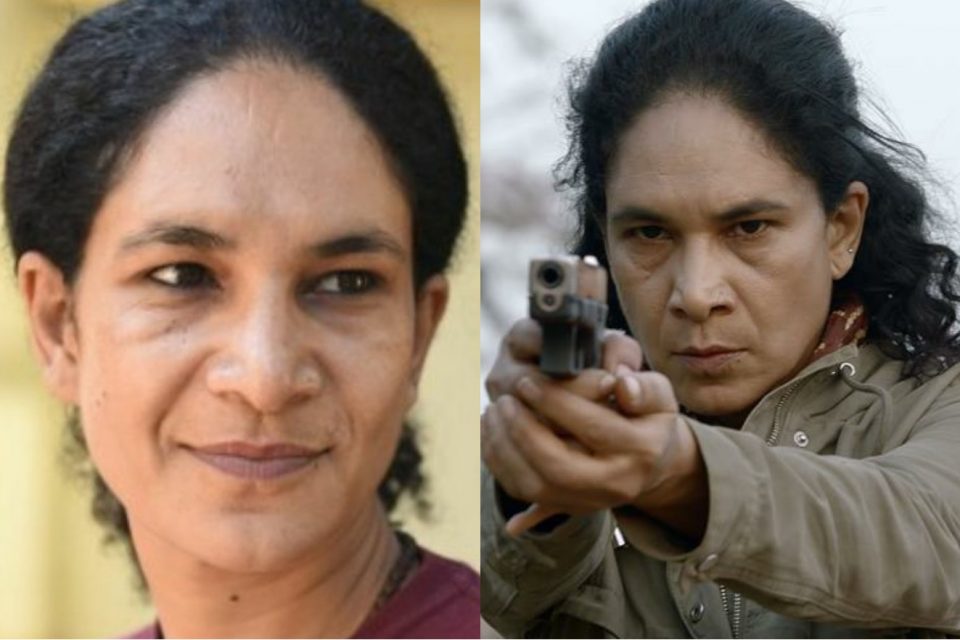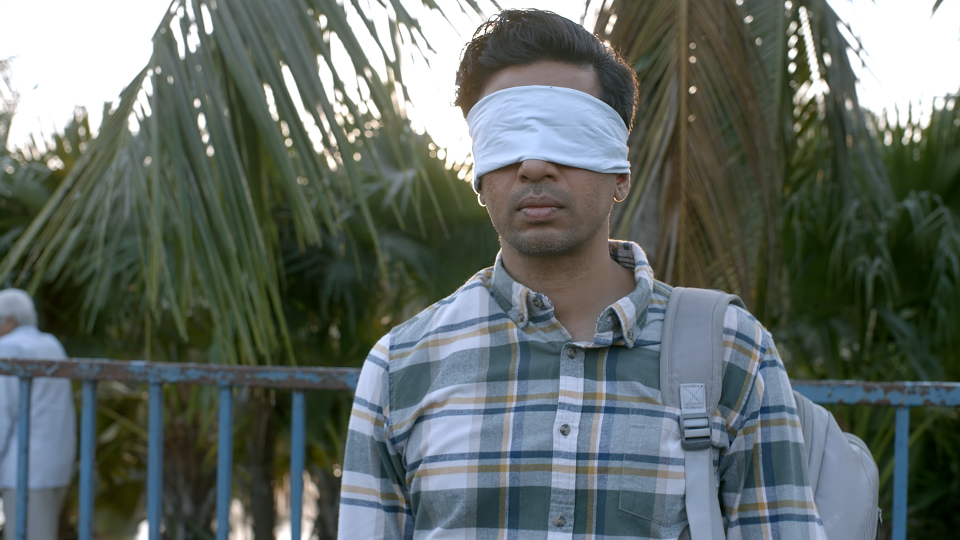‘Afsos’: Decoding the Anti-Hero
“Our approach was a little irreverent, a little lighthearted,” says director Anubhuti Kashyap about the black comedy/thriller series
It all started with a what if — “What if we make a show where nobody gets their way?” mused writers Anirban Dasgupta and Dibya Chatterjee while penning the script for their black comedy/thriller series Afsos. Based on the fake Bengali novel Golper Goru Chaande (a figment of the writers’ imagination), Amazon Prime Video’s latest offering follows a man (Nakul played by Gulshan Devaiah) whose “insufferable imagination” leads him to hire a hitwoman (Karima Upadhyay played by Heeba Shah) to kill him, all while a priest (Fokatiya baba played by Robin Das) sets out to give him the elixir of immortality.
The series, while initially intended for a showcase in Bengali cinema, changed both format and language as the writers (and co-creators of the show alongside Sourav Ghosh) decided to take their experiment to the digital platform. Not too long ago, a show like Afsos might not have found an expansive medium with global viewership, but the writers believe that with the dawn of Indian OTT in full-swing, “there is an audience for all kinds of shows,” especially an irreverent black comedy such as Afsos where nobody — and the writers dare cite themselves — gets what they want.

Dibya Chatterjee and Anirban Dasgupta (pictured above) co-wrote and created ‘Afsos’ with Sourav Ghosh. Photo: Amazon Prime Video
“If you see every character, their defining word is afsos (regret,)” says Dasgupta, “They’re all losing and facing the consequences of their own actions. They’re all grey and they all have a streak of evil. And it just feels right.” The trio had long debated on the stereotypical interpretations of a protagonist or hero, ultimately finding no basis in reality for such a character — at least not for the story they wanted to tell — and decided to sample the anti-hero instead. “Fate is funny,” says Chatterjee, “At times, we don’t get the desired result. This was a story about a man who tries hard but doesn’t get it. And we never get to hear his version because he’s not a winner.” Dasgupta, Chatterjee and Ghosh played with these themes — existence, ambition, loneliness — and the germ of Afsos was born, with the creators finding their reluctant hero in the portrait of a writer, Nakul.

Gulshan Devaiah plays Nakul in ‘Afsos.’ Photo: Amazon Prime Video
Plagued by an exaggerated sense of negativity, at first glance, Nakul seems to be a man with suicidal tendencies but Devaiah is forthright in making a distinction. “Nakul’s arc is not about depression and suicide. My interpretation of Nakul too was of a person who suffers from imagining his life to be worse than what it really is,” he says. The actor, in his portrayal of Nakul, was conscious of not making light of mental health issues, emphasizing that Afsos doesn’t delve into commentary on the topic either. He underlines context, hoping that when viewers tune in, the show lands successfully on its feet, establishing the nuance it was going for with the irreverence that its characters warrant. Much like his previous role as a councilman in this year’s Ghost Stories (which delved into class, religion and a portrait of the country), Devaiah expands on ideologies and motives, opining that Anjali Patil’s character, Shloka Srinivasan (the therapist who engages with Nakul), is far more wicked than a determined assassin with a target. “Shloka is the most dangerous because she can talk you into stuff. People who can talk you into doing stuff are dangerous,” he says. “Like our leaders,” Patil mutters under her breath.

Anjali Patil plays Shloka Srinivasan in ‘Afsos.’ Photo: Amazon Prime Video
Patil, for a change, had a buoyant yet challenging time portraying a character with more privileged agency than her previous roles (having played a Naxal commander in the Bollywood film Chakravyuh, a refugee in Sri Lankan film Oba Nathuwa Oba Ekka and survivor of a sex trafficking ring in Telugu film Naa Bangaaru Talli previously) and jumped into examining the notion of authority as a given. “As an artist, I think most of us are good at understanding psychology, because we have to understand our characters’ psychology,” she says, revealing how authority much like hypnosis can have the effect of a mild drug. She cites a theory Srinivasan applies on the show, “First you understand, then empathize and finally state your example, saying, ‘Okay, I understand, but can you change your perspective?’” There’s a fine line between medicine and mind games, and Patil enjoyed exploring that grey area in a show that makes no glory of morals.
It’s hard to talk about assassins in pop culture without invoking Jodie Comer’s Villanelle from Killing Eve. But English actor-writer Phoebe Waller-Bridge’s iconic character was just one of the reference points for the creators while fleshing out the persona of Karima Upadhyay played by Heeba Shah (who was last seen as the dangerously stoic housekeeper Shanti in Ghost Stories). Chief among them were also Javier Bardem’s Anton Chigurh from No Country for Old Men, Billy Bob Thornton’s Lorne Malvo from Fargo (there are plenty of references to the series in Afsos, keep an eye out for the not so commercial but definitely groovy bus advertisements) as well as Colin Farrell’s Ray from In Bruges and Tinnu Anand’s hitman character in Pushpaka Vimana. Evidently, they were setting up the stage for a man to take on the role but director Anubhuti Kashyap reveals that they were winging it at casting, echoing Dasgupta’s drone of how male hitmen “had already been done to death,” when they found the perfect assassin in Shah.

Anubhuti Kashyap directed ‘Afsos.’ Photo: Amazon Prime Video
“We were not very fixed on what kind of person or actor to cast for the role. The day we met Heeba, she came so simply and she approached the entire meeting so professionally all like ‘Okay, fine, if you want to hire me…it would be great. If you don’t want to hire me, it’s fine too,’’’ shares Kashyap. It was this nonchalance that convinced the creative team to cast Shah as Upadhyay. “She was not really trying to make an impression. We decided then and there ki yeh hain humaari (this is our) Upadhyay,” says Kashyap. One thing they inadvertently borrowed from Killing Eve? Spanish singer Pati Amor. The song “Killer Shangri-Lah” by Madrid-based songwriter and producer Pshycotic Beats featuring Amor rolled as Villanelle stabbed an old man in the series premiere and two years later, Amor sang series scorer Neel Adhikari’s composition “The Kill” and introduced Upadhyay to viewers. Chatterjee calls it yet “another divine intervention off camera,” much like how the entire series clicked together, through ideation that never stopped until something felt right. As Upadhyay shoots a dead man during his funeral — a kill she missed because life parted with the man before their meeting — the song sweeps in her wake as she makes her exit down the church aisle, clad in black.

Heeba Shah plays Karima Upadhyay in ‘Afsos.’ Photo: Amazon Prime Video
“Our approach to Afsos was a little irreverent, a little lighthearted and not too serious,” says Kashyap, reveling in the ethical absolution of dark comedies where the absurd, wild and weird don’t offer sacrifice at the altar of political correctness. “We don’t justify the intent of all the characters, but their intent is kind of pure from inside. They might be up to nefarious activities while strongly believing in what they’re doing. After all, they have their own motives and purpose,” says Chatterjee. Afsos was built on “gut feeling” with multiple characters holding the cards, opening the avenue for many endings — if even one. “I just have one word to say. It’s a clue as to where else the series can go,” says Devaiah. He goes back to Hindu mythology, invoking a figure divorced from death. “Ashwathama,” he says.






